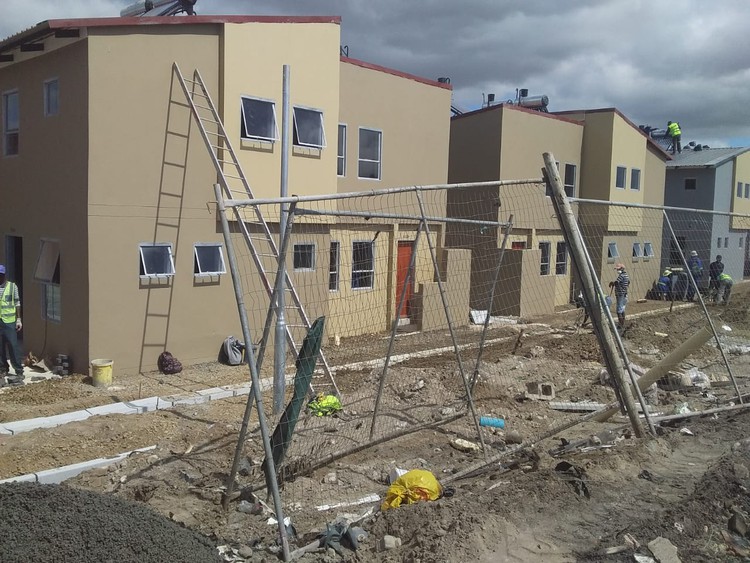Housing backlog exceeds half a million in Western Cape
City and Province’s housing demand drive adds 10,000 more to the database
More than 10,000 people across the Western Cape have participated in the ongoing housing demand database (HDD) drive, but some residents have raised concerns with the waiting period for a house.
The purpose of the drive by the provincial Department of Human Settlements and the City of Cape Town is to register new applicants and to give those who are already on the database a chance to check and update their details.
This year’s drive kicked off in the Southern Suburbs on 22 and 23 February for those living in Lavender Hill, Grassy Park and Pelican Park, then on 7 and 8 March it was the turn of Elsies River and Belhar, and on 14 March, Atlantis and Mamre. The public drives have since stopped, following the national lockdown until 16 April to curb the spread of Covid-19.
The overall housing backlog is currently in excess of 550,000 across the Western Cape, with more than 300,000 of these in the City of Cape Town. The likelihood of getting a house in the next ten years is very slim for most. .
Malusi Booi, Mayco Member for Human Settlements, said, “There is no specific timeframe for applicants to be on the database. It depends on the availability of housing opportunities and whether applicants qualify when the opportunities become available.”
The City’s three-year budget for housing is R2.7 billion. He said R2.1 billion has been allocated for the development of Breaking New Ground housing opportunities and the remaining R590 million is budgeted for the current financial year which ends in June 2020.
“We have various housing projects at different stages, be it in the planning phase, already underway or in the process of being finalised. Almost 47,000 housing opportunities were created since 2011,” he said.
According to Booi, the City’s housing database is electronic. “It is protected, updated and audited to ensure that homes are given to qualifying applicants in a fair, transparent and equitable manner to prevent queue-jumping and is run independently of the national and provincial government”.
Once applicants have registered on the database it is their responsibility to update their details. Once beneficiaries receive a subsidy, their names are kept on the database for record purposes, but their status is changed to indicate that they have received a housing subsidy for a housing opportunity, and therefore will not be eligible for another one, he said.
According to Marcellino Martin, spokesperson for provincial Housing Minister Tertius Simmers, each registered applicant is handled separately, following a set of criteria and priorities. He said elderly or disabled people and child-headed households, those longest on the waiting list, and backyard dwellers were usually prioritised.
“The provincial minister can use his discretion to assist the most vulnerable and can make a determination in cases where people have been on the database for less than three years,” said Martin.
For the financial year 2018-19, the province was allocated just over R2 billion for housing by the national treasury. It has earmarked 8,872 sites for housing and has built 7,828 units and homes.
The Housing Demand Database Drive
A card system has been used to track people applying for housing. The colour of the card indicates the year in which the person applied for housing. Red housing cards were issued in the 1980s, white housing cards were issued in the 1990s, and new A4 pieces of paper are now being issued instead of cards for those applying after 2000.
At most of the drives in the Cape metro, people came out in their numbers. But at the event held in Mamre, Travis Petersen, a community leader and member of the executive committee of the Mamre Residents Association, said, “The drive was not sufficiently communicated, there was minimal advertising, it was a disaster.”
Petersen said he had heard about the event “by chance”. He then posted about the event on social media, which was how most of those in attendance had heard about it. “Apart from that, there were no computers or laptops in sight at the venue. It boggles the mind. How are they updating a database without a computer? Even the person in charge at the venue could not explain to me exactly what the process for the day was when I asked her,” he said.
Steve Ross, a community leader from Elsies River, told GroundUp that the drive in his area was well attended but that there was “quite a bit of animosity from residents towards the people stationed to assist”.
Ross said, “Most people went to enquire about the timeframe. They wanted to know how much longer they would have to wait to receive houses because some of them have already been waiting for years.”
Meanwhile on Monday, the provincial government launched the first provincial Human Settlements App which is designed to offer easy access to information and government housing assistance. It also allows people to register for the first time or update their details on the database without having to visit a housing office.
Support independent journalism
Donate using Payfast

Don't miss out on the latest news
We respect your privacy, and promise we won't spam you.
Next: Why is PRASA still trying to buy trains that can’t be used?
Previous: Covid-19: Lockdown hits informal traders
© 2020 GroundUp.
This article is licensed under a Creative Commons Attribution-NoDerivatives 4.0 International License.
You may republish this article, so long as you credit the authors and GroundUp, and do not change the text. Please include a link back to the original article.

